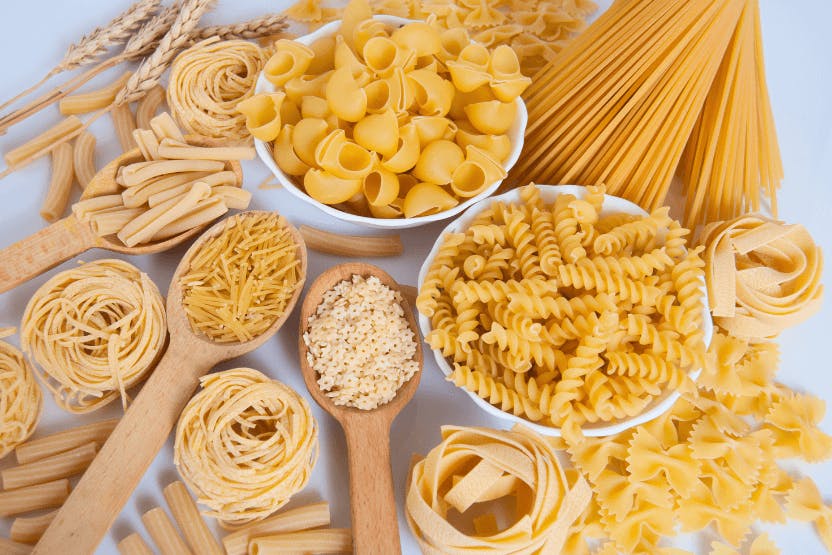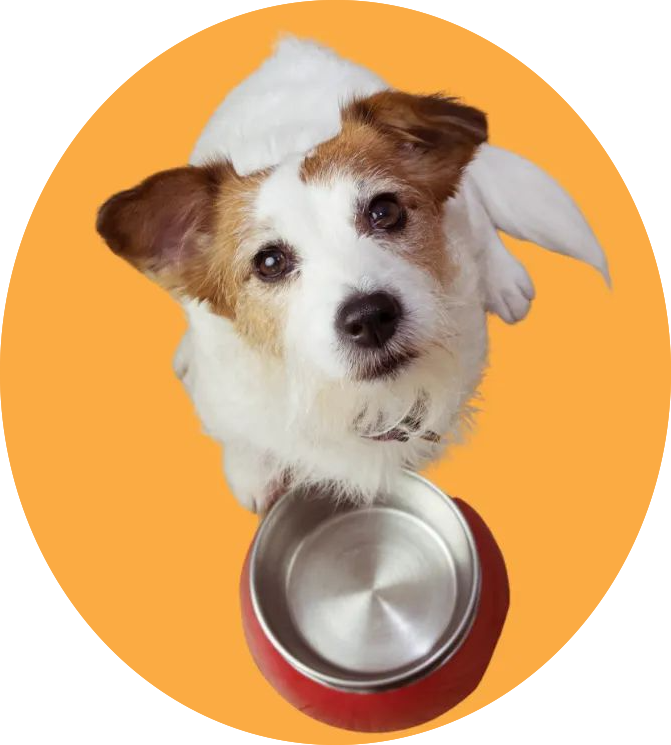
By Kevin Hughes
Published: 04/23/2024, edited: 06/14/2024
Reviewed by a licensed veterinary professional: Dr. Linda Simon, MVB MRCVS
More articles by Kevin Hughes
Save on pet insurance for your pet
You don't have to choose between your pet and your wallet when it comes to expensive vet visits. Prepare ahead of time for unexpected vet bills by finding the pawfect pet insurance.
Picture the scene. You’ve cooked a dinner of spaghetti and meatballs, oozing with tasty sauce and topped with a generous amount of cheese, which is gently melting into the delicious combo. As a pet parent, you know there’s a pair of pleading canine eyes watching your every move as you prepare to serve up — but the question is, can you share any of this with your dog? Can dogs eat pasta?
Pet parents know that whatever they’re eating, the dog wants some, too. In a dog’s mind, whatever’s yours is theirs, too — and that rule seems to apply to food more than anything else. However, dogs have finely-balanced digestive systems and are prone to sensitive stomachs, so ‘human’ food should only be shared in moderation, and only if it isn’t harmful to a dog.
So, where does pasta fit into all of that? Can dogs have pasta? If so, can they eat exactly what you eat? It’s not a simple yes or no answer, so let’s dig into the details.
Can dogs have pasta to eat?
Technically, yes — dogs can indeed eat pasta. There’s nothing in pasta itself which is harmful to a dog; it’s simply made with flour, eggs, and a splash of water. That said, flour does contain grains and gluten, and some dogs can have grain allergies or gluten allergies (or both) so if your pup falls into this category, pasta’s off the menu.
In fact, dogs can have a range of food allergies, though it’s likely you’ll already know what does and doesn’t affect your pet, and so therefore know you can and can’t feed him or her.
Allergies aside then, generally speaking, dogs can eat pasta — but there are particular rules to follow. If you’re asking, ‘can dogs eat plain pasta?’ the answer’s yes, but everything else is out of bounds.
Can dogs eat pasta sauce?
Now for the bad news — for dogs, anyway. Unfortunately, it’s a firm and non-negotiable no to the question of ‘can dogs eat pasta sauce?’ Pasta sauce should be avoided because of the ingredients it typically includes.
The store-bought tomato-based varieties typically have high amounts of salt and sugar in them, and many can include garlic and onions — both of which are toxic to dogs. Other pasta sauces can be heavily cream-based — some use double cream — which are almost certainly going to be way too rich for your dog’s stomach.
Even if you’re making your own pasta sauce, from scratch, at home, we wouldn’t recommend serving any of it to your dog. Most classic pasta dishes just won’t be suitable for your dog to eat and digest — Fettuccine Alfredo uses loads of butter and parmigiano reggiano cheese (a little cheese as a treat is fine for a dog, but not in liberal quantities) while spaghetti carbonara, another popular pasta dish, is loaded with cream.
The store-bought tomato-based varieties typically have high amounts of salt and sugar in them, and many can include garlic and onions — both of which are toxic to dogs. Other pasta sauces can be heavily cream-based — some use double cream — which are almost certainly going to be way too rich for your dog’s stomach.
Even if you’re making your own pasta sauce, from scratch, at home, we wouldn’t recommend serving any of it to your dog. Most classic pasta dishes just won’t be suitable for your dog to eat and digest — Fettuccine Alfredo uses loads of butter and parmigiano reggiano cheese (a little cheese as a treat is fine for a dog, but not in liberal quantities) while spaghetti carbonara, another popular pasta dish, is loaded with cream.
So, no pasta sauce for your pup. Just plain old pasta it is!
Can dogs eat whole grain pasta?
Yes, dogs can eat whole grain pasta. In fact, whole grain pasta is generally considered a healthier option compared to white pasta as it contains more nutrients — including fiber, iron, zinc and protein. The same principles apply when feeding your dog whole grain pasta; small portions only, with no additional seasoning or sauce.
Can dogs eat raw pasta?
No! Please don’t feed your dog raw pasta. While you’re preparing to cook your pasta, holding a handful of it before tossing it into the pan, it might be tempting to hand your dog a raw piece or two — but don’t. Raw pasta is, of course, hard and crunchy in texture and can easily get lodged in your dog’s throat, causing it to choke, or even break a tooth. There’s just no need to give your dog raw pasta.
Is pasta good for dogs?
We’ll level with you here. Pasta isn’t a particularly good food type to feed your dog — it doesn’t really have any notable health benefits. Pasta is high in carbohydrates, so while it’s a satisfying food that will deliver a welcome short-term energy boost, it also contains what are considered empty calories (it’s the same for people, by the way — a heavy pasta-based diet eaten regularly can result in weight gain).
If your dog eats too much pasta too often, don’t be surprised to see him or her starting to look a little bit chunky. Dogs will typically always try to eat whatever they’re given, so it’s a pet parent’s responsibility to prevent obesity and any other weight-related conditions.
If your dog eats too much pasta too often, don’t be surprised to see him or her starting to look a little bit chunky. Dogs will typically always try to eat whatever they’re given, so it’s a pet parent’s responsibility to prevent obesity and any other weight-related conditions.
So, to wrap it all up — can dogs eat pasta? Yes, they can; it’s a relatively harmless food. But your dog should only eat plain pasta, and absolutely nothing covered in a pasta sauce. As with all types of food, portion control is key — don’t overfeed your dog.
You may also like
